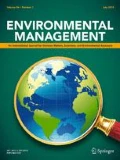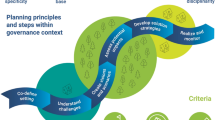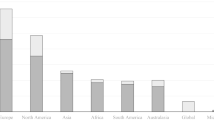Abstract
In evaluating effectiveness for collaborative environmental governance arrangements, a key concern is describing not just the processes and actors that are a part of these systems, but also the impacts that these processes have on ecological and social conditions. Existing research delineates an emphasis on process variables over outcome variables, as well as the difficulties of demonstrating causal relationships between collaborative governance processes and ecological outcomes. In this paper, we examined how process and outcome criteria are used by sponsors, industry practitioners, and participants of collaborative environmental governance (CEG) arrangements in Canada’s forest sector to ascertain effectiveness. We explicitly sought evidence from sponsors and industry practitioners of self-described effective forest advisory committees, anticipating that sponsors or practitioners might place greater emphasis than participants on outcome criteria over process criteria. We analyzed data from a nation-wide survey of forest advisory committee participants, conducted interviews with sponsoring agencies, and completed two in-depth case studies. We found that sponsors and industry practitioners, like participants, perceived a strong relationship between process and effectiveness. The perspectives of all participants helped us articulate ten key process criteria that they determined as essential for CEG. By including the insights of sponsoring agencies, our study provides both on-the-ground and management interpretations of process and outcomes as well as a nuanced approach to understanding the relationship between the two. However, we conclude that systematic evaluation approaches involving outcome-based criteria are still necessary and would provide a clear step towards encouraging accountability in CEG decision-making, both for sponsors and members.
Similar content being viewed by others
References
Ansell C, Gash A (2008) Collaborative governance in theory and practice. J Pub Adm Res Theory 18(4):543–571. https://www.jstor.org/stable/25096384
Armitage D, De Loë R, Plummer R (2012) Environmental governance and its implications for conservation practice. Conserv Lett 5(4):245–255. https://doi.org/10.1111/j.1755-263X.2012.00238.x
Arnstein SR (1969) A ladder of citizen participation. J Am Plan Assoc 35(4):216–224. https://doi.org/10.1080/01944366908977225
Beierle TC (2002) The quality of stakeholder-based decisions. Risk Anal 22:739–749
Berkes F (2010) Devolution of environment and resources governance: trends and future. Environ Conserv 37(4):489–500. https://doi.org/10.1017/S037689291000072X
Bowen GA (2009) Document analysis as a qualitative research method. Qual Res J 9(2):27–40
Bullock R, Lawler J (2015) Community forestry research in Canada: a bibliometric perspective. Policy Econ 59:47–55. https://doi.org/10.1016/j.forpol.2015.05.009
Canadian Council of Forest Ministers (CCFM) (2006) Criteria and indicators of sustainable forest management in Canada: national status 2005. Canadian Forest Service, Ottawa. http://www.ccfm.org/pdf/C&I_e.pdf
Chess C (2000) Evaluating environmental public participation: methodological questions. J Environ Plan Manage 43(6):769–784
Clement S, Guererro Gonzalez A, Wyborn C (2020) Understanding effectiveness in its broader context: assessing case study methodologies for evaluating collaborative Conservation Governance. Soc Nat Resour. https://doi.org/10.1080/08941920.2018.1556761
Creswell JW (2009) Research design: qualitative, quantitative, and mixed methods approaches, 3rd edn. Sage, Thousand Oaks
Creswell JW, Poth C (2018) Qualitative inquiry and research design: choosing among five traditions, 4th edn. Sage, London
Conley A, Moote MA (2003) Evaluating collaborative natural resource management. Soc Nat Resour 16(5):371–386. https://doi.org/10.1080/08941920309181
Diduck A, Reed MG, George C (2015) Participatory approaches to resource and environmental management. In: Mitchell B (ed) Resource and environmental management in Canada, 5th edn. Oxford University Press, Don Mills, p 142–170
Egunyu F, Reed MG, Sinclair AJ (2016) Learning through new approaches to forest governance: evidence from Harrop-Procter community forest. Can Environ Manage 57(4):784–797. https://doi.org/10.1007/s00267-015-0652-4
George C, Reed MG (2017) Revealing inadvertent elitism in stakeholder models of environmental governance: assessing procedural justice in sustainability organizations. J Environ Plan Manag 60(1):158–177. https://doi.org/10.1080/09640568.2016.1146576
Hunt LM (2015) Monitoring changes in forest resource advisory groups’ composition and evaluations of perceptions of public participation effectiveness: a case of Ontario’s Local Citizens Committees. Can J Res 45(12):1866–1872. https://doi.org/10.1139/cjfr-2015-0241
Koontz TM, Jager NW, Newig J (2020) Assessing collaborative conservation: a case survey of output, outcome, and impact measures used in the empirical literature. Soc Nat Resour. https://doi.org/10.1080/08941920.2019.1583397
Koontz TM, Thomas CW (2006) What do we know and need to know about the environmental outcomes of collaborative management?. Pub Adm Rev 66(s1):111–121. https://doi.org/10.1111/j.1540-6210.2006.00671.x
Lemos MC, Agrawal A (2006) Environmental governance. Annu Rev Environ Resour 31(1):297–325. https://doi.org/10.1146/annurev.energy.31.042605.135621
Lindgren A, Robson JP, Reed MG, Parkins JR, Sinclair AJ, Nadeau S, Hitomi M (2019) Engaging the public in sustainable forest management in Canada: results from a 2016 national survey of public advisory committees. Canadian Forest Service Information Report LAU-X-142E. https://cfs.nrcan.gc.ca/publications?id=39973
Lindgren A (2019) Exploring the effectiveness of Canadian forest advisory committees for advancing sustainability. Masters thesis, University of Saskatchewan. https://harvest.usask.ca/handle/10388/12329
Manetti G (2011) The quality of stakeholder engagement in sustainability reporting: empirical evidence and critical points. Corp Soc Responsib Environ Manag 18(2):110–122
Marek LI, Brock DJP, Savla J (2015) Evaluating collaboration for effectiveness: conceptualization and measurement. Am J Eval 36(1):67–85. https://doi.org/10.1177/1098214014531068
Margerum R (2008) A typology of collaboration efforts in environmental management. Environ Manag 41(4):487–500
Martineau-Delisle C, Nadeau S (2010) Assessing the effects of public participation processes from the point of view of participants: significance, achievements, and challenges. For Chron 86(6):753–765
Miller LF, Nadeau S (2017) Participatory processes for public lands: Do provinces practice what they preach? Ecol Soc. https://doi.org/10.5751/ES09142-220219
Nenko A, Parkins JR, Reed MG, Sinclair AJ (2019) Rethinking effective public engagement in sustainable forest governance. Soc Nat Resour. https://doi.org/10.1080/08941920.2018.1539198
Newig J, Fritsch O (2009) Environmental governance: participatory, multi-level and effective? Environ Policy Gov 19(3):197–214. https://doi.org/10.1002/eet.509
Nikolakis W, Hotte N (2019) How law shapes collaborative forest governance: a focus on indigenous Peoples in Canada and India. Soc Nat Resour. https://doi.org/10.1080/08941920.2019.1605433
Parkins JR, Davidson DJ (2008) Constructing the public sphere in compromised settings: environmental governance in the Alberta forest sector. Can Rev Sociol 45(2):177–196. https://doi.org/10.1111/j.1755-618x.2008.00009.x
Parkins JR, Nadeau S, Hunt LM, Sinclair AJ, Reed MG, Wallace S (2006) Public participation in forest management: results from a national survey of advisory committees. Information Report NOR-X-409E. Canadian Forest Service Northern Forestry Centre, Edmonton. https://cfs.nrcan.gc.ca/publications?id=26570
Parkins JR, Sinclair AJ (2014) Patterns of elitism within participatory environmental governance. Environ Plan C 32(4):746–761. https://doi.org/10.1068/c1293
Parson EA (2000) Environmental trends and environmental governance in Canada. Can Pub Policy 26:S123–S143
Patton M (2015) Alternative and competing criteria for judging the quality of qualitative inquiries: part 1 and Part 2. In: M Patton (ed), Qualitative research and evaluation methods 4th edn. Sage, Thousand Oaks, p 677–699.
Reed MG, Henderson AE, Mendis-Millard S (2013) Shaping local context and outcomes: the role of governing agencies in collaborative natural resource management. Hum Dimens Wildl 18(4):292–306. https://doi.org/10.1080/10871209.2013.801003
Reed MG, Varghese J (2007) Gender representation on Canadian forest sector advisory committees. For Chron 83(4):515–525
Reed MG (2010) Guess who’s (not) coming for dinner: Expanding the terms of public involvement in sustainable forest management. Scand J Res 25(9):45–54. https://doi.org/10.1080/02827581.2010.506785
Reed MS (2008) Stakeholder participation for environmental management: a literature review. Biol Conserv 141(10):2417–2431. https://doi.org/10.1016/j.biocon.2008.07.014
Robson M, Rosenthal J (2014) Evaluating the effectiveness of stakeholder advisory committee participation in forest management planning in Ontario, Canada. For Chron 90(3):361–370. https://doi.org/10.5558/tfc2014070
Rotherham T, Armson KA (2016) The evolution of forest management in Canada: management paradigms and forest tenure systems. For Chron 92(4):388–393. https://doi.org/10.5558/tfc2016-071
Saldaña J (2016) The coding manual for qualitative researchers. Sage, Los Angeles
Sinclair AJ, Diduck A, Fitzpatrick P (2008) Conceptualizing learning through environmental assessment: critical reflections on 15 years of research. Environ Impact Assess Rev 28:415–428
Teitelbaum S (2014) Criteria and indicators for the assessment of community forestry outcomes: a comparative analysis from Canada. J Environ Manag 132:257–267. https://doi.org/10.1016/j.jenvman.2013.11.013
Thomas CW, Koontz TM (2011) Research designs for evaluating the impact of community-based management on natural resource conservation. J Nat Resour Policy Res 3(2):97–111. https://doi.org/10.1080/19390459.2011.557877
Tuck E, McKenzie M (2015) Place in research: theory, methodology, and methods. Routledge, New York
Ulibarri N, Emerson K, Imperial MT, Jager NW, Newig J, Weber E (2020) How does collaborative governance evolve? Insights from a medium-n case comparison. Policy Soc 39(4):617–637. https://doi.org/10.1080/14494035.2020.1769288
Wesselink A, Paavola J, Fritsch O, Renn O (2011) Rationales for public participation in environmental policy and governance: practitioners’ perspectives. Environ Plan A 43(11):2688–2704
Yin RK (2014) Case study research: design and methods. Sage, Thousand Oaks
Zurba M, Diduck AP, Sinclair AJ (2016) First Nation and industry collaboration for forest governance in northwestern Ontario, Canada. For Policy Econ 69:1–10. https://doi.org/10.1016/j.forpol.2016.04.003
Acknowledgements
The authors would like to thank the individuals that participated in this study for their valuable time and insights. Our thanks to the team members that collaborated on the 2016 survey, including John Parkins, John Sinclair, Solange Nadeau, Sara Teitelbaum, and Maaya Hitomi. This work was made possible by funding from the Social Sciences and Humanities Research Council and the University of Saskatchewan.
Funding
This research was supported by funding from the Social Sciences and Humanities Research Council of Canada Insight Grant (#435-2012-0619), the Social Sciences and Humanities Research Council Canada Graduate Scholarship, and the University of Saskatchewan.
Author Contributions
All authors contributed to the study design and conception. AL conducted interviews, performed data analysis, and prepared the first draft of this paper. MR and JR provided revisions and comments to previous versions of this paper. All authors read and approved the final manuscript.
Author information
Authors and Affiliations
Corresponding author
Ethics declarations
Conflict of Interest
The authors declare that they have no conflict of interest.
Ethics Approval
This research received ethics approval from the University of Saskatchewan Behavioural Research Ethics Board (BEH 15-340) and was conducted in accordance with ethical standards for research involving human participants.
Informed Consent
Informed consent was obtained from all individual participants in this study.
Additional information
Publisher’s note Springer Nature remains neutral with regard to jurisdictional claims in published maps and institutional affiliations.
Rights and permissions
About this article
Cite this article
Lindgren, A.Y., Reed, M.G. & Robson, J.P. Process Makes Perfect: Perceptions of Effectiveness in Collaborative Environmental Governance. Environmental Management 67, 228–241 (2021). https://doi.org/10.1007/s00267-020-01402-5
Received:
Accepted:
Published:
Issue Date:
DOI: https://doi.org/10.1007/s00267-020-01402-5




